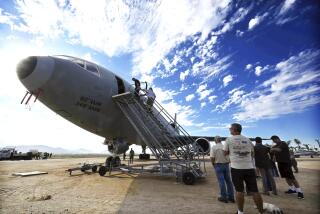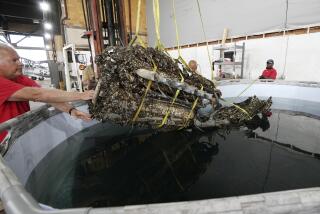It’s the 4th of July in June for Pilot
- Share via
AVIANO AIR BASE, Italy — An American hero came home to an emotional Main Street welcome in an airplane hangar Friday--and to sobering news from his boss that he had been the victim of an ambush carefully set by the Bosnian Serbs.
Air Force Capt. Scott F. O’Grady, safe after eluding capture in Bosnia-Herzegovina for almost six days, fought tears as he addressed an all-American crowd come to salute his return.
U.S. service personnel, VIPs, fellow pilots and their families turned the giant hangar at the air base into the Fourth of July with flags, bunting, kids on shoulders, Neil Diamond belting out “America,” cameras grinding. There was red, white and blue by the bucket.
They cheered, stamped their feet and some shouted “Amen!” when the 29-year-old pilot offered reverent thanks for the safe conclusion of his adventure.
“The first thing I want to do is to thank God,” the fighter pilot said, his voice cracking with emotion. “If it wasn’t for God’s love for me and my love for God, I wouldn’t have gotten through it. He’s the one that delivered me here, and I know that in my heart.”
O’Grady wore his olive green flight suit, the shoulder emblazoned with the blue and yellow shield of the 555th (Triple Nickel) Fighter Squadron and its motto: “Return With Honor.”
Meantime, jets from the North Atlantic Treaty Organization, based here, flew by in formation. Elementary schoolchildren sang the national anthem. Television cameras grouped square-jawed fliers before a sinister-looking F-16 that was brother to the one shot out from under O’Grady over Bosnia as he patrolled a United Nations-designated “no-fly” zone.
It was a feel-good day: 1,000 friends dressed in everything from workday uniforms to Bermuda shorts. Babies in strollers waved flags. Military police in black berets cradled automatic rifles.
O’Grady wiped away tears, pumped his fists with joy and popped a magnum of champagne. Doctors pronounced him fit, and his commanders said he would fly to the United States to visit relatives in Virginia and Washington state.
*
But there was a marked countercurrent as well, on a base where festivities were at times drowned out by the roar of the working NATO warplanes. About an hour’s drive north of Venice, Aviano has generated a local American community of about 8,700 service personnel and their dependents. Pilots like to say Aviano’s 30 minutes from the beach, 30 minutes from the mountains and 30 minutes from a Balkan civil war.
“Bosnia is a real place for us, just next door. Today is as happy as the shoot-down was sad. But they both remind us why we’re working so hard,” said Staff Sgt. Garfield H. Vassell of Long Beach.
O’Grady, nicknamed Zulu by his fellow pilots, did not on Friday detail his experiences in Bosnia.
But it turns out that he was the squadron officer assigned to teach survival techniques to his comrades. Lt. Gen Michael E. Ryan, commander of the U.S. 16th Air Force and NATO forces in southern Europe, told the crowd that the pilot from Spokane, Wash., “had a lot of training in escape and evasion and used it very well.”
Ryan said O’Grady evaded all contact for the nearly six days he hid in a wooded area of northwestern Bosnia but was actively being sought by Bosnian Serbs when U.S. Marines plucked him out at dawn Thursday.
“If you want to find some heroes, that’s where you should look, because those are the biggest heroes in the world,” said O’Grady of his rescuers.
Aviano alone sends as many as 80 sorties a day over Bosnia, where, Ryan said, Bosnian Serb air defenses include sophisticated SA-6 ground-to-air missiles.
NATO planes are often targeted, Ryan said, but when O’Grady and his flight leader, Capt. Robert Wright, took off on patrol on June 2, they had no indication that the area they would overfly was particularly dangerous. As a consequence, they were not accompanied by specialist aircraft designed to counter missiles.
“They were in an area where we had not suspected there were [SA-6] systems. The Bosnian Serbs intentionally set a trap and sprung it. We have lots of indications that was the case,” Ryan told reporters.
Wright, from West Palm Beach, Fla., said surprise was on the side of the Bosnian Serbs: “If we had known it was a trap, we wouldn’t have flown into it.”
Suddenly, Wright said, he and O’Grady were aware that missiles had locked on as they flew at 25,000 feet above the cloud-covered terrain. “Things happen very quickly in fighter aircraft. I saw the missiles come up out of the clouds, but it was only a question of three or four seconds before one hit Scott’s plane,” Wright said. “There was a big fireball, and I saw the plane break up, but I also saw that the cockpit looked OK.”
By the time O’Grady determined that he could not recover control, the F-16 was below the clouds and Wright above did not see him eject.
Wright spent time in the area but flew home dejected.
“When you lose your wingman it’s like losing a part of yourself,” Wright said Friday.
NATO looked hard for the pilot known by name only to his fellow pilots. Radio traffic called him Basher Five Two, his call sign.
There came only silence, day after fear-the-worst day. Until about 1:30 a.m. Thursday. Drifting through empty black skies over Bosnia in his F-16, Basher One One, Capt. Thomas O. Hanford of Phoenix had been calling on an emergency frequency assigned to O’Grady’s rescue radio.
“Basher Five Two, Basher Five Two, this is Basher One One.”
No response, no response.
Then the night came alive: “This is Basher Five Two. I’m alive, I’m alive.”
“What a thrill,” Hanford said. He passed the news to a NATO AWACS plane, helped to pinpoint O’Grady’s location and held his breath while the Marines went in a few hours later.
The rest is history among the Triple Nickel pilots and Hanford’s comrades at the 510th Fighter Squadron, which also flies from Aviano.
Hanford’s own role, mind you, turned out to be a bit more complicated than it might have been: “It’s hard to fly an F-16 with tears streaming down your face,” he said.
More to Read
Sign up for Essential California
The most important California stories and recommendations in your inbox every morning.
You may occasionally receive promotional content from the Los Angeles Times.










